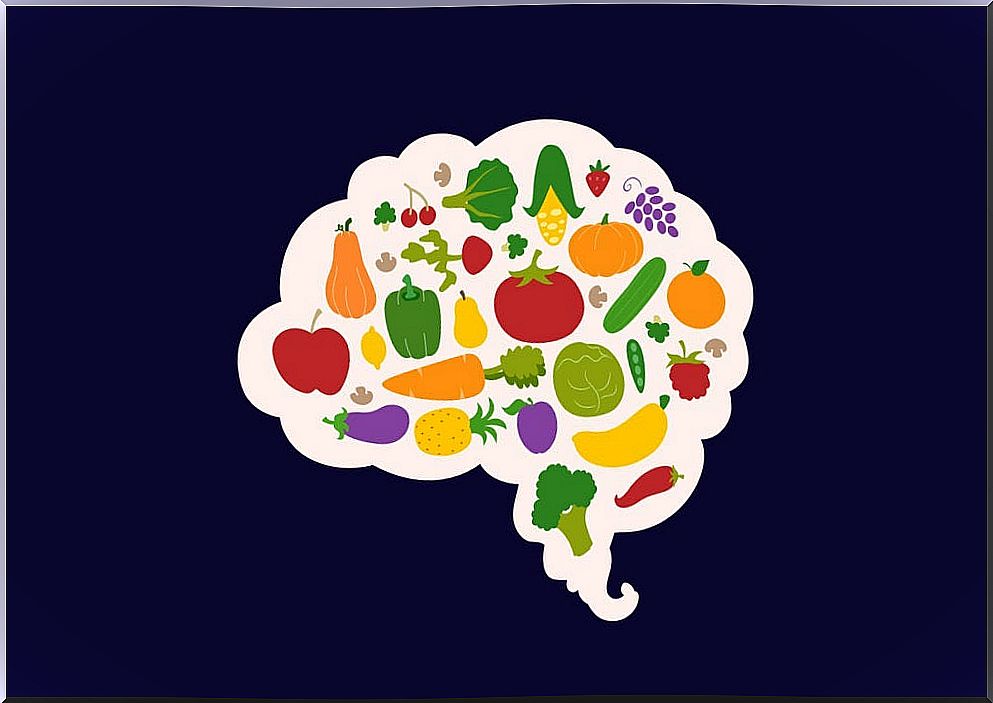The Brain And Food: Eating Healthy Is Not As Easy As It Sounds

The brain and nutrition have a direct relationship, an association that we do not always give the importance it deserves. We live in an age where we are bombarded with terms like “ real food” and “ conscious eating ”. We are also encouraged to follow a diet to meet certain standards of beauty or choose so-called “superfoods” that will take maximum care of our health.
Now, there is something we should consider: we would have to pay more attention to how food makes us feel than to how it causes changes in our body image. Because the truth is, the brain also modulates the type of food we choose based on how we feel, which doesn’t always work in our favor.
So, rather than obsessing about following certain diets or choosing products that look very healthy, it would be wise to take another approach. Regulating and controlling emotions is just as important as choosing what to put on your plate each day.

How are the brain and food related?
If there’s one thing the brain loves, it’s fat, sugar and salt. For our distant ancestors, it was difficult to access these very useful resources for survival. In this way, it seems that we are somehow programmed to consume as much as we can when we have them within our reach. The way their consumption activates our reward circuits is very intense, and we could even say that they are very powerful reinforcers.
So whenever we go through difficult times and ups and downs, it’s common to try to activate our reward circuit in this way. The fast food rich in fat, salt and sugars, gratifies the brain and gives us an instant pleasure. However, this pleasure is brief and also addictive. Little by little, we start to have eating habits that are harmful to physical and psychological health.
Emotional hunger and the “cheating” brain
It would be wonderful to have a brain that would always motivate us to choose the healthiest option to include in our diet. However, the way we eat is based on our education, culture and biology. So if we ask ourselves now which factor most influences the way we eat, the answer is simple: emotions.
The brain does not help us to maintain a correct diet. Studies, such as those carried out at the University of Amsterdam, show something revealing. People who eat only for their emotions take longer to feel full. There is a problem in the stimulation of the GLP-1 receptor associated with satiety.
We are the result of our good (or bad) habits
The brain is the sophisticated result of our evolution. Furthermore, there is something evident: the diet itself has been an indisputable factor in human selection and progress. Going from primitive hunting and gathering to the much more nutrient-rich Paleolithic diet was an evolutionary milestone.
The brain and food are the clear result of our lifestyle habits. So much so that many of today’s diseases, according to a study by Dr. Bob Weinhold, an expert in epigenetics, are largely dependent on external factors around us.
Society, education, work, stress, culture… All these elements affect the way we eat and this, more than genes, affects our health.
The brain is shaped by what we see, feel and what society conveys to us. These days, eating well takes time. Our lifestyle, based on haste, worry and pressure, invites us to feed the emotions, not the body.

Brain and Food: Emotions Affect Food (and vice versa)
Emotions are also eaten, or rather, they drive us to choose some products over others. This also invites us to reflect on the fact that, in reality, we cannot differentiate between “good” and “bad” foods. The problem lies in the quantity and difficulty of having a varied and balanced diet.
The brain and food feed back in two ways. On the one hand, we know that the way we feel affects the products we choose to eat in each moment and situation. Now, what we give to our bodies also influences how we feel.
As an example, researches such as the one carried out at the University of Foggia, in Italy, indicate that the Mediterranean diet, for example, favors our mental health. However, basing our diet (exclusively) on high saturated fat and high calorie levels can lead to depression.
In conclusion, let us always try to remember that, beyond the fads and diet gurus, there are our emotions. Healthy eating also requires knowing how to manage stress, anxiety, self-esteem, and all aspects that affect psychological balance.









